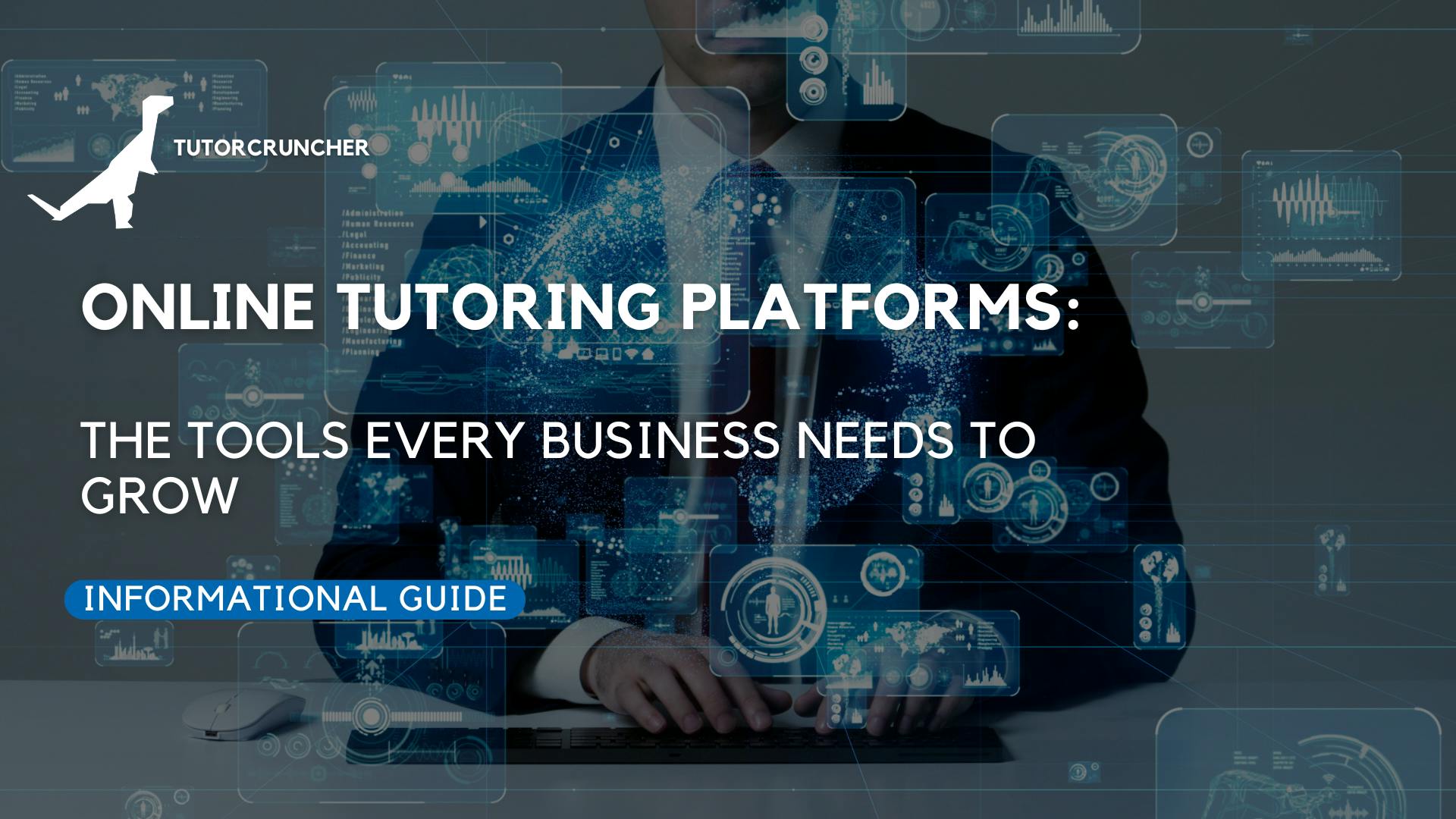Deciding whether to tutor (or be tutored) online or in person is a big decision.
As you are most likely aware, there are pros and cons to both methods and the best way to decide which option is right for you is to weigh these against your own goals and ambitions.
In this blog post, we'll take a closer look at the advantages and disadvantages of each method so that you can make an informed decision about what's best for you so read on!
How does online tutoring work?

Online tutoring is a powerful and increasingly popular method of learning that allows students to receive individualised instruction from experienced instructors or educators. At its core, online tutoring works by pairing students with qualified online tutors who help them to review materials, work through problems, and prepare for exams. In this case, the interactions are completely virtual, using video chat or online collaboration tools to facilitate communication between the involved parties.
Online tutoring helps students to hone their understanding of various subjects and improve their academic performance through personalised instruction and feedback. With this increased level of support and guidance, more students are able to achieve success in school and beyond.
How effective is online teaching?

Online tutoring can be a highly effective tool for students of all ages. Whereas traditional, in-person tutoring sessions typically take place in a controlled setting, with one student and one tutor working together at a desk, online tutoring allows for much more flexibility. Students can learn from the comfort of their homes or anywhere else that is convenient for them, without having to travel to a physical location or adhere to set meeting times.
Additionally, many online tutoring programs are designed with adaptive technology that provides real-time feedback and performance tracking based on each student's progress. This allows both students and online tutors to easily monitor progress and adjust learning strategies as needed, maximising the effectiveness of lessons.
How effective is in person tutoring?

In person, private tutoring is also a highly effective form of learning support. While online resources and digital course materials certainly have their place in the modern educational landscape, there are many benefits to working one-on-one with a skilled tutor.
For one, in person tutoring puts you face to face with an expert who can help you to understand difficult concepts and stay focused on your learning goals.
Additionally, a tutor can help you to stay motivated and engaged in your studies. In person tutoring fosters active learning, which helps students to retain more knowledge over time. With so many advantages, it's easy to see why in person tutoring remains such an effective educational tool even with the rise of online learning.
Tutor Online vs In Person: The Pros and Cons for Tutors

There are several factors to consider when deciding whether to tutor online or in person. Let's start by taking a look at the pros and cons of tutoring online, for tutors:
Pros of Tutoring Online
- You can quickly and easily reach a global audience of students
- You can work from anywhere in the world with no geographical restrictions
- Students can receive help at any time of day or night
- You can easily scale your business by adding more students
- You don't need to rent office space or buy supplies
- You can use video conferencing and tutor management software to connect with students in real-time and keep your business organised
Cons of Tutoring Online
- You need to have a strong and stable internet connection at all times
- There may be technical difficulties from time to time
- Some students prefer in-person interaction and learn better in a physical learning environment
- You won't have the opportunity to build a rapport with your students in person which can impact their ability to learn from you
Pros of Tutoring In Person
- You can more easily build strong working relationships with your students
- You can get immediate feedback from your students
- Some concepts are best taught in person (e.g., hands-on and practical science experiments)
- Students may feel more comfortable meeting face-to-face
Cons of Tutoring In Person
- You're limited to teaching students who live near you
- You need to find a suitable place to meet (e.g., library, coffee shop) or pay for a dedicated office space
- You need to factor in student travel time when scheduling appointments meaning you may have to take on fewer students
Tutor Online vs In Person: The Pros and Cons for Students

Now let's have a look at the pros and cons of tutoring online, for students:
Pros of Being tutored online
- It is convenient. Students can receive help from anywhere in the world as long as they have an internet connection.
- It gives students the opportunity to choose their tutor from a pool of qualified experts
- Online tutoring is usually more affordable than in-person tutoring, it is a good option for students on a budget
Cons of being tutored online
- It can be difficult to build a rapport with your tutor since you are not meeting in person
- Online tutoring can be distracting because there are many other things going on online that can take your attention away from your studies
Pros of being tutored in person
- It is easier to build a strong working relationship with your tutor and know early on if you are a good fit
- You are able to ask questions and get immediate feedback
- Practical subjects and concepts are often better learned when you see them demonstrated in person
Cons of being tutored in person
- You have to pay for travel expenses on top of your tutor’s time
- You have to find a place to meet that is convenient for both of you
- There may be no tutors available in your local area with the time or expertise to help you sufficiently
Are certain subjects better suited to in person vs online learning?

There is no doubt that online learning has become a central part of modern day learning. With the advent of high-speed internet and convenient online resources, it is easier than ever for students to access educational materials from anywhere in the world. However, many people believe that certain subjects are better suited to in-person learning vs online. For example, some argue that practical subjects like science and math are difficult to fully grasp without actually performing the relevant experiments or calculations first hand.
Likewise, creative subjects like art and music benefit greatly from being learned directly from an expert teacher or instructor. Ultimately, whether a subject is better suited to in person learning vs online may depend on various individual factors, including one's own personal learning style as well as the goals and resources available to each learner. Nevertheless, it is important not to overlook the many benefits offered by online education, as this mode of learning can be an effective tool for both teaching and learning.
How do you decide which is right for you and your students?
When choosing a learning platform for your students, there are a number of factors to consider. First and foremost, you will need to think about the needs and preferences of your students. Some students may be more technologically minded and prefer working with interactive digital tools, while others may prefer more traditional methods like face-to-face instruction and print resources.
When it comes to digital tools, you will want to consider the features and functionality of each platform. Are they easy to use? Do they support a variety of activities and assignments? And what level of technical support is offered? There is no one right approach that works for all teachers and students so you will have to reflect on your own teaching style and judge how well this meshes with online or in person resources. Ultimately, it comes down to what is most effective and appropriate for your unique context.
What contextual factors should you consider when making your decision?
When determining whether to teach online or in person, there are several contextual factors you can examine in order to make the choice. The first is your own experience and comfort level with new technology. Online courses usually involve using a variety of virtual tools, such as discussion forums, email, and video conferencing software. If you have limited comfort using these tools and get easily overwhelmed by complicated interfaces, it might be better to stick to teaching in person. Another important consideration, as mentioned previously, is the learning style of your students. If your students are accustomed to a more traditional learning environment where the teacher is face-to-face with the class, then perhaps teaching online would not be the best fit for them.
Finally, it's important to pay attention to logistical factors, such as how much time you'll need to devote to planning lessons and grading assignments for an online class versus an in-person class. Ultimately, whether you favour teaching online or in person will depend on your individual strengths as a teacher and what's best for your students and their overall learning outcomes.
Which option is more affordable - online or in-person tutoring?
When considering options for academic support, one of the first factors students and their parents will consider is cost. Both online and in-person tutoring have their own pros and cons, but which of these options is more affordable?
Online tutoring tends to be cheaper than in-person tutoring, as it often involves less hands-on assistance and remedial instruction. However, some may find the lack of face-to-face interaction to be unappealing and prefer the flexibility and direct support offered by in-person tutoring services. If you are looking to offer a high level of individualised guidance then in-person tutoring may be your best bet. But if you are looking for cost savings associated with lessons delivered remotely and via technology, then online tutoring could be a great option for you.
Which option is more convenient - online or in-person tutoring?
With regard to convenience, it is important to consider factors like time, location, and accessibility. With in-person tutoring, students have a chance to interact directly with you and learn from the one-on-one interaction. This can be helpful if they need a little extra support or thrive in a structure that requires direct involvement from both parties.
On the other hand, online tutoring can be an effective way to support learning from the comfort of home and provide a profitable service without having to leave your bedroom. This can free up a lot of your time to dedicate around other commitments or hobbies.
Risks associated with tutoring online vs in person
While many people tend to gravitate towards online teaching simply because it is more convenient, it is important to recognize that there are also certain risks associated with this method. For example, it can be difficult for both students and online tutors to determine if misunderstandings or errors are occurring during virtual sessions. By comparison, in-person tutoring has the advantage of allowing for instantaneous feedback and clarification. However, these in-person sessions also come with their own share of potential problems, such as transportation issues or scheduling conflicts.
Ultimately, like most things in life, there isn't a clear-cut answer when it comes to the pros and cons of online versus in-person tutoring. Instead, it really depends on a variety of factors such as student age and preference as well as budget constraints and other logistical considerations.
Conclusion
With all of this considered, if you're looking for flexibility and the ability to reach a global audience of students, then tutoring online is probably the best option for you. If you prefer working with students one-on-one and building relationships with them, then tutoring in person might be a better fit. Ultimately, the decision is up to you but we hope this blog has given you some food for thought and helped you to make a more informed decision. If you are looking for more information on how to set up your own tutoring business, or simply need more tips on strategies and tools for learning check out some of our other guides for both tutoring professionals and students alike. Thanks for reading!



